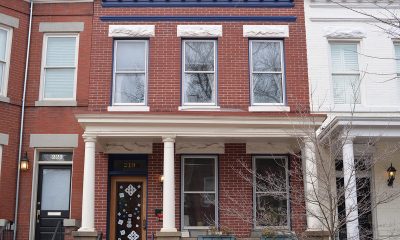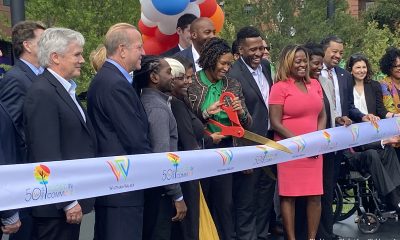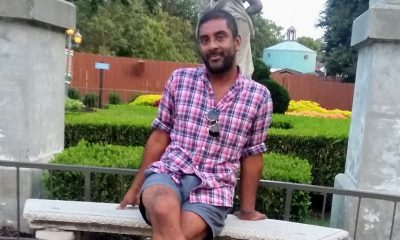Arts & Entertainment
Sue Ellen redux
‘Dallas’ actress on her former co-stars, life after Larry and the hit show’s gay following
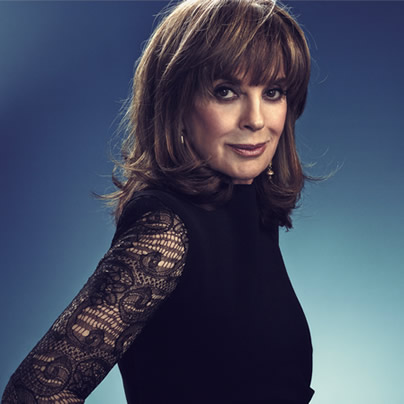
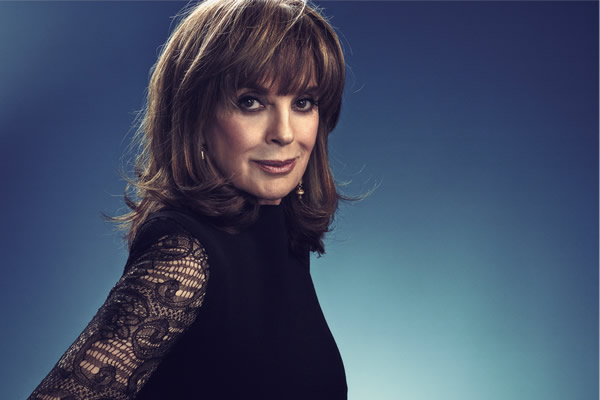
Linda Gray as Sue Ellen on ‘Dallas.’ Gray says it’s been a joy to return to the show 20 years later. (Photo courtesy TNT)
“Dallas,” the reboot of the classic 1978-1991 nighttime soap, returns for its third season Monday night on TNT and promises plenty of fresh backstabbing and intrigue.
John Ross (Josh Henderson) is working to live up to his father’s reputation, Christopher (Jesse Metcalfe) is reeling from a failed engagement and Elena (Jordana Brewster) is consumed with finding the justice that eluded her brother Drew (Kuno Becker) and mother Carmen (Marlene Forte).
It’s a pivotal turning point for the show — this will be its first full season without J.R. as actor Larry Hagman died in November 2012. He was in seven of season two’s 15 episodes and his character’s death was a major storyline last year.
Linda Gray, whose iconic character Sue Ellen has been willing to help her son any way she can on the new show, caught up with the Blade during a break in filming in Dallas two weeks ago, where it was snowing.
WASHINGTON BLADE: Snow is somewhat unusual but not unheard of for Dallas, right?
LINDA GRAY: I know. I’m just in heaven. It’s beautiful.
BLADE: You live in Los Angeles?
GRAY: Yes. I’m in Dallas six months, then L.A. six months. That’s a nice combination.
BLADE: I understand more of the show is filmed on location than was true for the old “Dallas,” right?
GRAY: Yes. We used to come here in the ‘80s for two months and work six days a week, then we went home and did eight-and-a-half months in L.A. So here we do 15 shows and we live here which is really kind of nice. At first we were like, “Oh, we have to move to Dallas?” but it’s quite amazing because then we get to show the audience all the greatness of Dallas. It’s changed so much since the ‘80s.
BLADE: How aware have you been of the show’s gay following? Do you sense it’s any different now than it was on the old show?
GRAY: I’m very aware it has a gay following and I’m beyond thrilled. I have so many, many, many friends who are gay and I adore them. There’s a JR’s and a Sue Ellen’s here, gay bars.
BLADE: We have a JR.’s in D.C., too.
GRAY: Oh, do you really? It’s so fantastic to have the support and we’ve always had it and … it’s been great. We love you right back. Dallas itself has a huge gay community here and they’re very supportive as well.
BLADE: What similarities or differences do you see now in how the show is rebounding dramatically from Larry’s passing versus how the original series dealt with the death of Jim Davis (Ewing family patriarch Jock)? I know it’s not exactly the same thing, but both were huge losses to the shows just a few seasons in.
GRAY: The entire team has changed, the writers, everything has changed and it’s an evolution that is — well, I step back and I look at this 20-year hiatus and it’s very bizarre to come back and do it again, but in such a good way. So now I think the approach is kind of like we’re outsiders looking in and seeing how the Ewings have evolved. And now without Larry, that threw everybody a curve and those wonderful writers — I always applaud the writers because without them and their great brains and their minds that kind of go off in wonderful directions, there would be no show. They had last season already approved by the networks and when Larry passed, they had to scramble and again, I applaud them because they did a magical shuffling around to kind of piece this together and still be an interesting, entertaining show without the key, which was huge — J.R. Ewing and Larry Hagman, I mean you know that was a huge void for me personally and I’m sure for everybody in the audience, it’s huge. So I look at it as an observer and say, “Wow, what a great job they’ve done.” They have to handle everything as it comes, as we all do in life. You don’t expect this to happen, but it did and now what are you going to do with it? When Jim Davis died, the producers were great. They moved his dressing room right on the soundstage because just like Larry, he wanted to die doing what he loved. They didn’t say, “No, you’re going into hospice or something,” they moved his dressing room right on the soundstage so we would do a scene and come in and hang out with Jim. When you’re doing a series, you’re so bonded as a family. You step in there and you’re supportive and you send them love. I would say “Dallas” has been blessed with a little bit of fairy dust that has been scattered on us from day one. The cast was wonderful, the writers were great, et cetera, and now it’s happening again and since I was one of the originals, it’s amazing to see how similar it is.
BLADE: You worked with Barbara Bel Geddes (Miss Ellie) for many years. After she left before the last season, she never appeared in any final episode, TV movies, cast reunions or anything. What would she think of this new series? (Bel Geddes died in 2005.)
GRAY: She was a savvy, bawdy broad, is what I called her, and I would call it to her face. We were so close. I’d call her Mama, on and off camera. She was this crusty New England broad. She was feisty and fabulous and such a huge classy addition to the Ewing family. I really was so shocked when I knew she was doing a series because I thought Barbara Bel Geddes, you know she worked with Tennessee Williams and Alfred Hitchcock. She was so classy and so when I first walked into the room, I’ll never forget it. I saw Major Nelson — Larry Hagman. I saw Patrick Duffy — “Man From Atlantis.” And then I saw Barbara Bel Geddes and I thought, “What’s wrong with this picture? Is this a sitcom? What is this show?” Internally I started laughing because I thought what is this? … But I just watched this magical thing happen and, you know, the Ewings became bigger than life. So for me it was great to work with her. She was astounding, she was quiet, she would make great funny little remarks during the rehearsals and then when you had a scene with her, man, you better be on your toes. You better bring your A game because she could bury you with a look. She was to me the same caliber as my two favorites — Judi Dench and Maggie Smith. There was no nonsense with her. It was just, “I’m here to work, I know what I’m doing, I’m a professional, I’m Broadway trained, I’m theater trained, I’ve worked with the best so don’t mess around with me.”
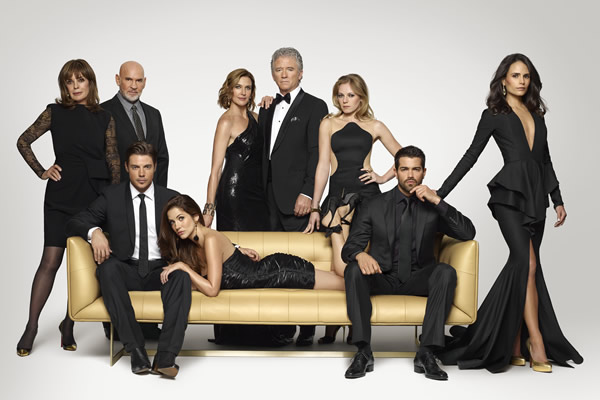
The cast of ‘Dallas.’ The reboot of the classic series returns Monday night. (Photo courtesy TNT)
BLADE: But what would her reaction be to this new series?
GRAY: I think she’d probably sit down with a glass of Scotch in her condominium and probably just laugh her ass off. She’d probably roll her eyes, going “How are we back again” and “Look at that younger generation.” But she would be a hoot. I think she would love the new show, love the kids, complain about everything — she loved to complain. She’d complain it was too hot, or, “What the hell are we doing, it’s snowing today,” or “What am I doing in Dallas,” blah blah blah blah blah. Yet the bottom line, she would love it.
BLADE: Victoria Principal has been a little different — she’s said she’s against reviving Pam in any kind of dramatic way, yet has joined up a few times in a non-dramatic capacity like the Vanity Fair photo (1995) and the 2004 reunion special. Over the years do you feel the rest of the cast has respected her wishes not to revive Pam or do you think there’s been some arm twisting to have her join in more often?
GRAY: I think we all respect her. I don’t think she wanted to come back and I don’t even know if the producers went after her or tried really pursuing her, I really don’t know. When you’re asked to come back, your gears are in different motion. You’re in forward motion. You’re thinking, “OK, gotta get to Dallas,” and you don’t really say, “Why isn’t so-and-so here?” For each person, it’s their choice and her choice was not to be in it so you respect everybody’s choice. We don’t see her very often. She was never kind of with us, you know, she was never — Larry, Patrick (Duffy) and I were very close and I was very close with Barbara and she just chose not to be as inclusive. I don’t mean that to — she just didn’t hang out with us.
BLADE: Any chance we might be seeing more of Lucy (Charlene Tilton)?
GRAY: Those are great questions but I don’t know the answers. The producers and writers, they write the scripts and if Lucy comes back, great, Ray Krebbs comes back, Steve (Kanaly) it’s always great to see him and it’s always fun to see them all. I do see Charlene in Los Angeles. She lives near my children. You know, it’s this great family, but since they’ve added all the young new people, it’s crowded. How many people can you bring back? It is fun for the audience when you see Charlene (Lucy), Steve (Ray Krebbs) and Kenny (Cliff Barnes), but it’s more a question for the producers.
BLADE: Larry was so anti-smoking yet Barbara smoked a lot. Did they ever clash over that on set?
GRAY: No, she would just tell him to get lost or, you know, just dismiss him. I think she smoked more in private. I never saw her smoke on the set.
BLADE: Now that it’s so many years later, do you feel the dream season was a good idea? People seem divided on whether it was clever or a jump-the-shark moment.
GRAY: Well, I don’t think people know all the dealings of how it really came about. Larry called Patrick and said, “I want you back.” He felt J.R. needed that brother, the good guy-bad guy kind of thing. I remember he called Patrick and Patrick knew when he got that phone call, what Larry was going to propose. He knew that intuitively. So he went over to his house in Malibu and they had a glass of Champagne and they may have gotten in the Jacuzzi, I don’t really know what happened there, but he talked Patrick into coming back so it was up to the producers to bring Patrick back and that was not an easy task to come up with. You know up front, no matter what they did, they would be criticized. … That was one of the things about “Dallas” that was exciting was that people would talk about it the next day. Did you like this? Look at Sue Ellen’s hair. Did you hate this? What about Bobby? What about J.R. drinking? Whatever. He’d call it water cooler chat. Whether you liked it or not, we knew it was going to cause chaos. So they had the idea for him to do the fake Irish Spring soap commercial where they edited out everything but him saying, “Good morning.” … A lot of people hated it and just stopped watching the show, they said it was ridiculous. A lot of people thought it was funny. A lot of people went, “Wow, that was a great dream sequence.” So no matter how you felt, good, bad or indifferent, they needed him back and they accomplished that.
BLADE: You look great but still look like yourself. What’s your skin care regimen?
GRAY: You’re sweet, thanks. When my peers no longer look like themselves, it scares me. There’s not a secret, I swear. I have a great skin care regimen. I never sleep with makeup on, I drink a lot of water. Hydration is huge. I eat great. I cook most of my own meals. A lot of green stuff — we’re from California, remember. And that’s it. You know, a good attitude goes a long way. And I exercise. I do all the things we’re supposed to do. Sometimes I don’t want to. I don’t want to get up early and go to the gym, but I do. I think complexion is more important than pulling and cutting your face. I’d rather have a good glowy complexion, so I use good skin care products and I use them twice a day. It’s like brushing your teeth. There’s no big secret.
BLADE: Could you ever imagine a gay wedding at Southfork?
GRAY: Sure! Why not?

Team DC, the umbrella organization for LGBTQ-friendly sports teams and leagues in the D.C. area, held its annual Night of Champions Awards Gala on Saturday, April 20 at the Hilton National Mall. The organization gave out scholarships to area LGBTQ student athletes as well as awards to the Different Drummers, Kelly Laczko of Duplex Diner, Stacy Smith of the Edmund Burke School, Bryan Frank of Triout, JC Adams of DCG Basketball and the DC Gay Flag Football League.
(Washington Blade photos by Michael Key)




















The 2024 National Cannabis Festival was held at the Fields at RFK Stadium on April 19-20.
(Washington Blade photos by Michael Key)
















Covering the @NatlCannaFest at RFK Stadium for @WashBlade . Stop by the LGBTQ+ booth and pick up a paper if you are here. pic.twitter.com/is7hnsaPns
— Michael Patrick Key (@MichaelKeyWB) April 20, 2024
Theater
‘Amm(i)gone’ explores family, queerness, and faith
A ‘fully autobiographical’ work from out artist Adil Mansoor

‘Amm(i)gone’
Thorough May 12
Woolly Mammoth Theatre
641 D St., N.W.
$60-$70
Woollymammoth.net
“Fully and utterly autobiographical.” That’s how Adil Mansoor describes “Amm(i)gone,” his one-man work currently playing at Woolly Mammoth Theatre.
Both created and performed by out artist Mansoor, it’s his story about inviting his Pakistani mother to translate Sophocles’s Greek tragedy “Antigone” into Urdu. Throughout the journey, there’s an exploration of family, queerness, and faith,as well as references to teachings from the Quran, and audio conversations with his Muslim mother.
Mansoor, 38, grew up in the suburbs of Chicago and is now based in Pittsburgh where he’s a busy theater maker. He’s also the founding member of Pittsburgh’s Hatch Arts Collective and the former artistic director of Dreams of Hope, an LGBTQ youth arts organization.
WASHINGTON BLADE: What spurred you to create “Amm(i)gone”?
ADIL MANSOOR: I was reading a translation of “Antigone” a few years back and found myself emotionally overwhelmed. A Theban princess buries her brother knowing it will cost her, her own life. It’s about a person for whom all aspirations are in the afterlife. And what does that do to the living when all of your hopes and dreams have to be reserved for the afterlife?
I found grant funding to pay my mom to do the translation. I wanted to engage in learning. I wanted to share theater but especially this ancient tragedy. My mother appreciated the characters were struggling between loving one another and their beliefs.
BLADE: Are you more director than actor?
MANSOOR: I’m primarily a director with an MFA in directing from Carnegie Mellon. I wrote, directed, and performed in this show, and had been working on it for four years. I’ve done different versions including Zoom. Woolly’s is a new production with the same team who’ve been involved since the beginning.
I love solo performance. I’ve produced and now teach solo performance and believe in its power. And I definitely lean toward “performance” and I haven’t “acted” since I was in college. I feel good on stage. I was a tour guide and do a lot of public speaking. I enjoy the attention.
BLADE: Describe your mom.
MANSOOR: My mom is a wonderfully devout Muslim, single mother, social worker who discovered my queerness on Google. And she prays for me.
She and I are similar, the way we look at things, the way we laugh. But different too. And those are among the questions I ask in this show. Our relationship is both beautiful and complicated.
BLADE: So, you weren’t exactly hiding your sexuality?
MANSOOR: In my mid-20s, I took time to talk with friends about our being queer with relation to our careers. My sexuality is essential to the work. As the artistic director at Dreams of Hope, part of the work was to model what it means to be public. If I’m in a room with queer and trans teenagers, part of what I’m doing is modeling queer adulthood. The way they see me in the world is part of what I’m putting out there. And I want that to be expansive and full.
So much of my work involves fundraising and being a face in schools. Being out is about making safe space for queer young folks.
BLADE: Have you encountered much Islamophobia?
MANSOOR: When 9/11 happened, I was a sophomore in high school, so yes. I faced a lot then and now. I’ve been egged on the street in the last four months. I see it in the classroom. It shows up in all sorts of ways.
BLADE: What prompted you to lead your creative life in Pittsburgh?
MANSOOR: I’ve been here for 14 years. I breathe with ease in Pittsburgh. The hills and the valleys and the rust of the city do something to me. It’s beautiful, it’ affordable, and there is support for local artists. There’s a lot of opportunity.
Still, the plan was to move to New York in September of 2020 but that was cancelled. Then the pandemic showed me that I could live in Pittsburgh and still have a nationally viable career.
BLADE: What are you trying to achieve with “Amm(i)gone”?
MANSOOR: What I’m sharing in the show is so very specific but I hear people from other backgrounds say I totally see my mom in that. My partner is Catholic and we share so much in relation to this.
I hope the work is embracing the fullness of queerness and how means so many things. And I hope the show makes audiences want to call their parents or squeeze their partners.
-

 District of Columbia5 days ago
District of Columbia5 days agoNew D.C. LGBTQ+ bar Crush set to open April 19
-

 District of Columbia5 days ago
District of Columbia5 days agoReenactment of first gay rights picket at White House draws interest of tourists
-

 Arizona5 days ago
Arizona5 days agoAriz. governor vetoes anti-transgender, Ten Commandments bill
-

 South America3 days ago
South America3 days agoDaniel Zamudio murderer’s parole request denied

